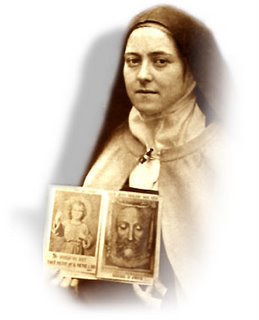What To Do With A Few Spare Minutes?

I know, I can blog for a little bit.
1. A conversation continued from this post at the Undercroft:
The point I was trying to make has much more to do with our concept of God than it does with liturgy. For if we expect the solution to the crisis in Christianity to be that every person who calls himself a Christian find an ancient liturgical "Philosopher's Stone", what kind of God does that make the God of Abraham, Isaac, and Jacob? Is the solution to all of this lie in an esoteric set of rituals known only to those who can sit through an hour ceremony in a dead language? I know evangelical Protestants and I very much doubt that God will judge them for not being able to do this.
Does God meet us where we are? Or is He playing a cruel joke on the vast majority of those who believe in Jesus Christ, even Roman Catholics? I am sorry, I thought that this Jansenist view of God died the death with the humble lines of a young Carmelite nun in nineteenth century France. Perhaps I am wrong, but if I am, we are all neck deep in cosmic hot water.
2. Refer to this post: How come many Roman Catholic traditionalists are so eager to condemn people for being outside the Papal Communion if they themselves are unwilling to receive Holy Communion from the hand of the Pope himself due to the ceremony that he uses (the Pauline Missal)? Does this make sense to anyone?



6 Comments:
C'mon Arturo - all that Cranmer's doing you no good at all.
The reason Evangelicals don't fancy sitting through an hour-long Mass is because they believe completely different things from us - so it's incomprehensible to them, even in the vernacular; or when comprehensible, a "blasphemous fable" (check your 39 Articles). To us on the other hand, it's normal and natural - nothing remotely esoteric about it. No-one ever left the Church because the Mass was "esoteric". They left because they'd lost the faith. Similarly no-one who found the faith ever hesitated on account of the liturgy; on the contrary, converts are often among the most passionately liturgical of all Catholics.
I know lots of evangelicals and like and admire many of them - but we can't all be right. Where we differ - and we differ on pretty big stuff - well, it's necessary to let them know they've got the wrong end of the stick. Whether or not they're personally to blame is known only to God but there's no point in pretending that their strange beliefs and concomitant practices are compatible with the Church's faith; sola scriptura is indefensible nonsense, just for starters.
So - to put it another way: does the God of Abraham require me to sit through "worship songs" and lurid, idiotic histrionics in in a converted industrial unit for two hours every Sunday? It's possible - what He required of Abraham initially in the way of sacrifice was a good deal more onerous than hour of Church Slavonic.
I mean "possible" only in a rhetorical sense, naturally. I don't consider it possible at any level that God wills and desires Evangelical worship, or the cock-eyed theology it expresses.
How come many Roman Catholic traditionalists are so eager to condemn people for being outside the Papal Communion if they themselves are unwilling to receive Holy Communion from the hand of the Pope himself due to the ceremony that he uses (the Pauline Missal)? Does this make sense to anyone?
Yes of course it does - you know the reasons better than me, I'm certain, and they've got nothing to do with "Latin". The Pauline rite is wrecking the Church. We can't have anything to do with it, any more than we'd connive at sharing a bottle of paint-stripper just to please an alcoholic parent.
"Yes of course it does - you know the reasons better than me... et alia"
Yes, I do know the reasons, and they still do not make any sense. The traditionalist argument reduces the concept of being in communion to a legal fiction, so one might as well be an Anglcan. To follow the Pope and not follow him cannot be done at the same time. Communion must be mainfest in the current time and space or it is meaningless.
In what sense does one "follow" a "rock"?
...on the other hand I'm not pretending that it isn't a perfectly fair point. If the arguments stand up at all, it is only insofar as they continue to be predicated on the contingent, temporary, "emergency" character of the present situation. They certainly could not be sustained indefinitely. Either the Church will "rebalance" or a breach of some sort is inevitable. "Neo-catholicism" certainly isn't the historic faith (it's rather more like the Protestant parody of the historic faith). "Traditionalism" is principled and internally coherent, provided the "pain" continues to be felt. What's neither principled nor coherent is "ultramontane traditionalism" which simply ignores the "conciliar Church" as it waits for the reincarnation of Eugenio Pacelli to put everything back to the way it was.
Post a Comment
<< Home